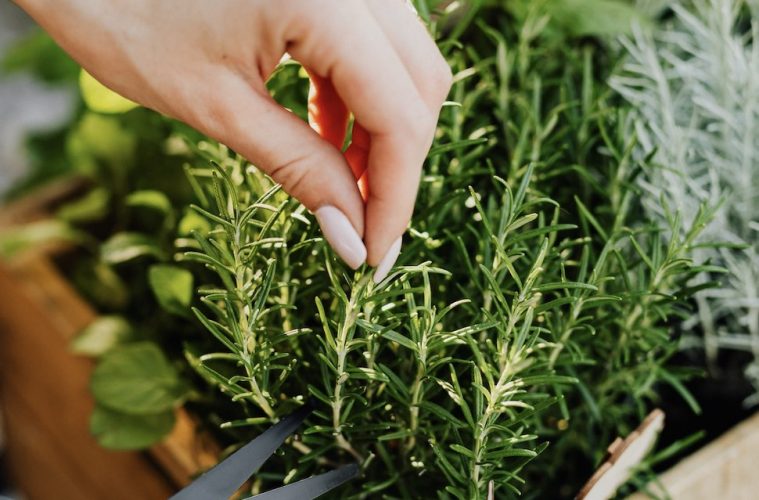Fresh herbs are known for imparting a fantastic flavour to savoury dishes, but there are also many earthy savoury herbs that pair well with desserts or in sweet dishes to add interest and enhance the flavour of the food.
Herbs like lavender or mint are obvious choices in sweet dishes, but there are many more options that, when matched with the right dessert, make for an unbeatable combination.
Savoury Herbs To Pair With Sweet Desserts:
Thyme
Thyme is a mild herb. This savoury herb pairs well with sweet biscuits like shortbread, cakes and any dessert that has fruit in it. Thyme leaves added to a peach tart, for example, heighten the sweetness of the fruit and round off the dessert. Lemon and thyme are an excellent combination and perfect together in a cupcake, iced with vanilla and thyme icing. If you plant lemon thyme, you have the best of both worlds too.
Plant thyme in a sunny spot in well-draining soil or on a sunny windowsill in a pot. It’s a hardy perennial that needs little attention. Water deeply when the soil is dry and harvest the fragrant leaves regularly for use in the kitchen. Add a mulch of compost in spring to provide extra nutrients and prune back to contain the growth if necessary.
ALSO SEE HERBS IN THE GARDEN: PROPAGATING
Basil
Usually used in savoury dishes like pesto, basil is also excellent when paired with fruit and cakes. It has a peppery sweetness that makes it good for both sweet and savoury dishes. It goes well with creamy dishes and ice cream, fruit granitas and makes a refreshing sorbet. Infuse basil into sugar for a syrup that can be poured over cakes, meringues and cream, and fruit salad.
Sweet basil likes lots of water and soil that is moist yet well-draining. It prefers at least 6-8 hours of sun a day, but will also do well in a partially shaded position. Plant in the warm months and add a layer of mulch to preserve moisture in the soil. Keep pruning off the centre shoots to prevent the plants from flowering and going to seed. This makes them bushier and provides more leaves to use in the kitchen.
Rosemary
Rosemary is a great herb for cakes and desserts, especially when paired with citrus. The piney peppery taste of rosemary enhances the flavour of sugar and makes for an interestingly deep flavour. Use in pastry for a woodsy taste and in syrups to pair with baked fruits, to enhance the flavour of baked custards or infused into ice creams or granitas.
Rosemary grows well in a sunny spot with well-draining soil. As a perennial shrub it can grow quite tall – up to 2m depending on the variety – but it can be trimmed to keep it low. There are also cascading varieties that will grow down a wall for a more Mediterranean look. They prefer warm temperatures and will not withstand the cold – in that case, grow in containers that can be moved indoors.
Borage
Borage has long been used in the making of cocktails, especially the pretty blue flowers, but it can be used in desserts as well. The leaves are also edible and taste a bit like cucumber with a touch of salt. It pairs well with lemons in lemonade or strawberries in daiquiris, but also in jellies, cakes and syrups. You can use the blue flowers as decoration by candying them too.
Borage is an exceptional pollinator magnet (especially bees) and grows in just about any soil in a sunny position. With regular watering, it will grow lush and have many flowers in summer and into autumn.
Parsley
Perhaps one of the most unusual herbs to use in desserts, parsley has an earthiness that doesn’t immediately say sweet. However, it has become more popular in cakes, tempered with a few handfuls of mint, and it’s used in recipes for Japanese cheesecake served with strawberries. You can also use it in ice cream or infuse into a sugary syrup for fruit, especially stone fruit and berries.
Parsley is easy to grow in containers or in the garden in a sunny position with at least 4 hours of sun a day. Give them plenty of water and harvest regularly to keep the plants pruned and spouting new growth. It needs fertile soil that drains well and monthly fertilising to keep it healthy.
ALSO SEE GUIDE TO GROWING HERBS INDOORS

